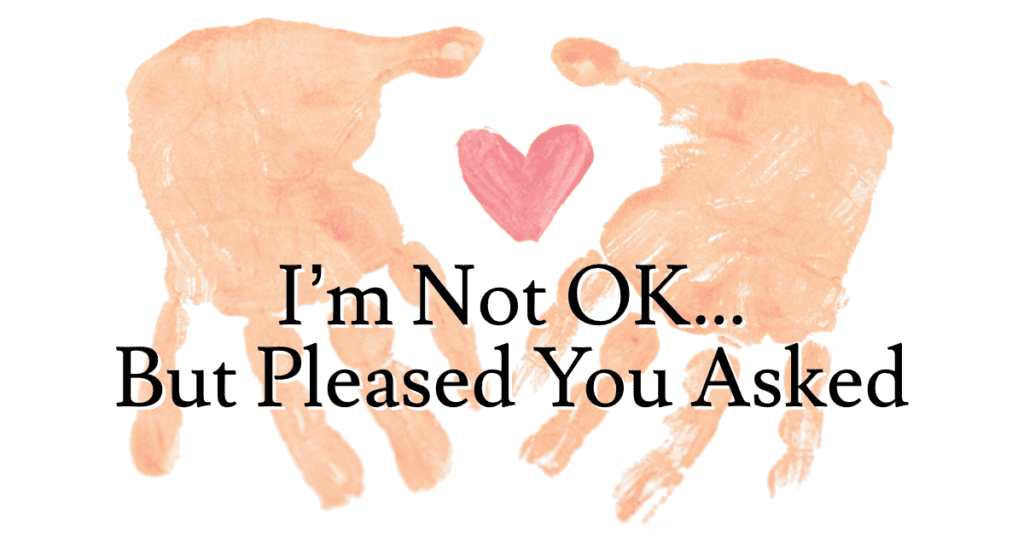Table of Contents
I know not everyone’s had this experience, and I’m sorry if yours is unlike mine, but the outpouring of support I’ve received from friends and family has been both touching and overwhelming.
And it’s coming from so many different directions. From all of over the world, Jews and non-Jews alike.
I find every word moving and appreciate them all. No, I am not OK. And even if it is sometimes hard to keep up with everyone, and even though some well wishes will not make a dent in the stress and pain of the times, their sentiments are well-received.
And I am grateful to have all of them in my life.
Not OK, Thanks for Asking

But not everyone is grateful. Not everyone sees things the way I do.
I’ve seen some interesting posts the last several weeks. And one style of post has irked me a bit.
The post basically looks something like this:
“No, I’m not OK. My people are getting murdered, raped, and kidnapped. We are in a war, and we are fighting to survive. It’s pure hell. So stop asking me if I’m OK.”
It’s an angry person telling people to keep their empty words to themselves. Criticizing people for asking unwelcome and obvious questions, burdening those of us who struggle with their vapid attempts to make us feel better.
And I couldn’t disagree more.
Why People Reach Out

There are multiple reasons why people are reaching out.
Yes, they are genuinely concerned for the safety of us and our families. But it’s not necessarily for us. It’s for them as well. They’re sitting at home, in relative peace and comfort. They’re panicking. And uneasy. And they feel like they need to do something, besides just flipping through awful posts on Facebook.
So they reach out. And it becomes our duty, albeit a challenging addition to everything else going on around us, to comfort the world. To let them know that even though we are struggling and stressed out of our minds, we are at the very least safe.
That’s not to say their concern for our wellbeing isn’t real. It’s that it’s potentially more complex than that.
What Can You Possibly Say?

And what do you say when you wish to check up on someone who’s life has been disrupted by a vile and revolting terror attack, followed by a war?
Fact is, there are no words that will do the trick. So we resort to the basics.
How are you? How’s the family? How’re you holding up?
You’re in my thoughts. You’re in my prayers. We’re all thinking about you.
Are they generic? Of course they are. But no more generic than anything any one of us pulls out when we wish to comfort someone in mourning. We don’t know what to say. We never do. We’re uneasy. We are trying to comfort someone through the unfathomable, a task that is virtually impossible. We want to say something beautiful, heartfelt, and inspiring. But instead we say, “I’m so sorry for your loss.”
Generic. It’s a real sentiment, but so oft repeated it loses any and all value.
But we’ll say it anyway. We always will.
Because there’s nothing else to say.
Stress On Top of Stress

But please don’t kick me out of your house of mourning. Because despite my inability to put together a coherent thought, my heart is in the right place. I would do anything if I felt it would lead to your comfort in this time of tragedy.
That’s what we all mean when we are sitting there, fidgeting, wanting the moment to just end. We simply want to give you the best possible chance of moving through this tragic point in your life, and we revert to cliche. Because we have nothing else to offer. It’s too far out of our control.
If someone writes me from America or France or Australia and asks me if I’m OK, I tell them my family and I are currently safe. Stressed. But safe.
Am I OK? No. I am really not OK. I recall thinking many times during the pandemic that one of the most challenging parts of the experience is with all this new misery, the remaining stressors of the world never ceased existing. In fact, they didn’t even slow down slightly.
So here I stand with health issues and professional issues and personal issues and an overflowing plate of responsibility, and then life throws at me a global pandemic.
Or in this case, a war.
Not OK

No, I’m not OK. None of us are. There are those pretending better than others. There are those with massive defense mechanisms that make them capable of enjoying themselves despite what’s going on around them.
But if you contemplate for just a few minutes that you are surrounded by violent, aggressive monsters who have proven they are more than willing to rape civilians, murder babies, and desecrate bodies, you’d never sleep again, let alone be able to throw down a few beers with some friends.
So no, I’m not OK. My family’s not OK. My country’s not OK. Hell, the world’s not OK.
But I appreciate you checking in. I really do. I know what you mean when you ask, and you shouldn’t stop asking.
And as much as you’re here for me, I’m here for you.
Status Report
I’m here to let you know that where I am it’s relatively quiet. There’s a hint of depression and fury in the air. The world is a different place than it was just a matter of days ago. And everyone around me is contemplating feelings they shouldn’t need to contemplate. Everyone’s growing up a little faster than they ever wanted to. But being bombarded by terrible thoughts and feelings is worlds apart from getting your life overturned by death, rape, and kidnapping. It’s even worlds different than being displaced temporarily from your home.
But it’s not nothing.
In the world of complex emotions, there are many gradations. And everyone is more than entitled to their own. And fearing for those you care about from a distance is both understandable and welcome.
I’m not doing great. To be honest, it was hard beforehand. This is just pouring a lake into an already overflowing bucket.
Thank you for checking in.
I really do appreciate it.




People ask me all the time if our kids are OK.
They live in war zone – not great. But they work, go to school.
We feel helpless always and hopeless too often. We were supposed to leave the world a better place for the next generation. We have failed miserably.